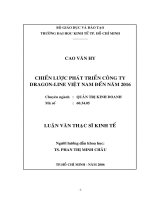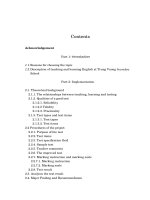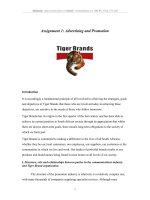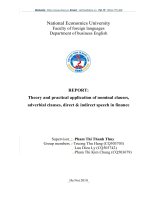Finance Assignment Telstra 2016
Bạn đang xem bản rút gọn của tài liệu. Xem và tải ngay bản đầy đủ của tài liệu tại đây (111.08 KB, 6 trang )
1.
Basic information
A glance at Telstra’s website provides some basic information of the
company, namely its ticker symbol is TLS, its primary industry is
telecommunications and information services, the current share price is $5.64 with
12,443,074,357 shares in total and the market capitalization is $70,179 billion. In
addition, data from Yahoo! Finance website reveals the company’s share price
target summary, wherein mean target is $5.58, median target is $5.62, high target is
$6.20 and low target is $4.70.
Acccording to Financial Times, the company’s top holders held 6.08 percent
of shares, namely Captial Research & Management Co. (1.42%), Vanguard
Investments Australia Ltd. (0.98%), The Vanguard Group, Inc. (0.66%), Schroder
Investment Management Australia Ltd. (0.64%), BlackRock Fund Advisors
(0.56%), Australian Foudation Investment Co. Ltd. (0.43%), Norges Bank
Investment Management (0.39%), Argo Investments Ltd. (0.35%), FIL Investment
Management (Australia) Ltd. (0.33%) and BlackRock Investment Management
(Australia) Ltd. (0.33%).
2. Investment Summary
Telstra is an Australia’s leading telecommunications and information services
company, founded in 1901 and based in Melbourne, Australia. According to the
company’s website, their purpose is “to create a brilliant connected future for
everyone” and their core values are “show we care, work better together, trust each
other to deliver, make the complex simple and find our courage”, with which they
align every they do and by which they measure all of their actions.
Considering significant recent developments of Telstra, according to Analyst
Briefing Presentation and Materials 2016, there were several highlights in the
company’s results for the half-year ended 31 December 2015. In the presentation,
Andrew Penn - CEO said “In the first half of the 2016 financial year we grew fixed
broadband, bundle and mobile customer numbers. We saw strong income growth
with more modest growth in EBITDA and net profit after tax”. In particular, by
comparison with the first half of 2015 financial year, total income (excluding
finance income) for the half year increased 9.1% to $14.2 billion, EBITDA was up
1.7% to $5.4 billion and net profit after tax was up 0.8% to $2.1 billion on a
reported basis. Additionally, earning per share (EPS) grew 1.8% to 17.2 cents per
share and the interim dividend declared by the company’s Board was 15.5 cents per
share, up 3% compared with the previous corresponding period. Furthermore, in
the first half financial year 2016, Telstra added 235,000 domestic retail mobile
customer services and 121,000 retail fixed broadband customers; NBN Definitive
Agreements revenue increased to $636 million with further major contracts signed;
mobile network data climbed 42% and Network Applications and Services revenue
was up 37% with further margin improvements compared to the prior year
according to Andrew Penn.
Turning to earning forecast, Yahoo! Finance webstie provided analyst
estimate for the company’s earning in June 2016 and June 2017 as the following
table:
Table 2.2 Earning Estimate
Current Year
Next Year
Earning Estimate
Jun 2016
Jun 2017
Average Estimate
0.36
0.37
Number of Analysts
17
17
Low Estimate
0.31
0.31
High Estimate
0.46
0.38
Year Ago EPS
0.35
0.36
(Soure: )
3.
Looking at the table 2.2, it was estimated that the average EPS of financial
year 2016 ended in June will increase 2.86% to $0.36 and that of 2017 will increase
2.77% to $0.37 compared with the previous corresponding period.
Business Description
According to Yahoo! Finance website, “Telstra Corporation Limited provides
telecommunications and information services to businesses, governments,
communities, and individuals in Australia and internationally. The company
operates through Telstra Retail, Global Enterprise and Services, Telstra Operations,
and Telstra Wholesale segments. It offers a range of telecommunication products,
services, and solutions across mobiles, fixed and mobile broadband, telephony, and
pay television; data and Internet protocol networks; network applications and
services, such as managed network, unified communications, cloud, industry
solutions, and integrated services; and hybrid fiber coaxial cable services. The
company also provides telecommunication products and services to carriers,
carriage service providers, and Internet service providers; and connected health IT
ecosystem for the healthcare sector. In addition, it offers digital media content
services; eHealth solutions for primary care, aged and residential care, hospitals,
radiology and pathology, pharmacy, indigenous care, and telemedicine; advertising
services; and connectivity solutions, such as managed network services, as well as
data, voice, and satellite solutions”. Furthermore, according to Telstra website, the
company provides 16.9 million mobile services, 7.2 million fixed voice services
and 3.3 million retail fixed broadband services. It distributes its services through
371 retail stores, 84 business centers, and 137 business and enterprise partners, as
well as through 18,700 retail points of presence.
The company’s key drives of revenues are Fixed, Mobile, Data and IP, and
Network Applications and Services (NAS) products. Meanwhile, key drives of
expenses are labour and goods and services purchased. According to the Financial
results for the half year ended 31 December 2015 published by Telstra on the
company’s website, key product revenues and operating expenses are shown in the
following tables:
Table 3.1 Key product revenue
1H16
1H15
Change
$m
$m
%
Fixed
3,564
3,620
(1.5)
Mobile
5,526
5,328
3.7
Data and IP
1,914
1,664
15.0
NAS
1,336
1,007
32.7
(Source: )
Table 3.2 Operating expenses
1H16
1H15
Change
$m
$m
%
Labour
2,751
2,432
13.1
Goods and services purchased
3,920
3,262
20.2
Other expenses
2,108
1,993
5.8
Total operating expenses
8,779
7,687
14,2
(Source: )
In addition, Telstra has to pay for financial expenses among which interest on
borrowings is the largest one. In particular, interest on borrowings in financial year
2015 was $875 million, accounting for approximately 96 percent of financial cost
according to Telstra annual report 2015 published on the company’s website.
4.
a.
Investment Risk (internal and external)
Material business risks
A glance at Telstra annual report 2015 reveals the company’s material
business risks which affect their operating results and therefore affect their
shareholders. These risks are described as follow according to the annual report
provided:
•
•
•
•
•
•
•
b.
Business model is the risk that the company cannot respond to techonology and
market development in a productive and cost-effective way “due to changing
market conditions, including accelerated technology advancements, increasing
customer expectations of performance, and competitors with disruptive and simpler
business models in both domestic and global markets”.
Business resilience is the risk of disruption to the services the company provides to
its customers “due to factors such as rapidly growing demand and reliance on
telecommunications services, greater exposure to complex international networks,
and external shocks, such as extreme weather events and natural disasters”, which
affects the company’s customers as well as its corporate reputation.
Data management is the risk of collecting, using or managing customer and
corporate data in a way that is inconsistent with the company’s regulatory
obligations or doesn’t meet the expectations of its customers. This risk can result in
“significant reputational, financial and regulatory implications” as well as damage
customers’ trust.
Regulatory environment is the risk that there is the emergence of unfavourable
regulatory requirements causing complexity and cost of doing business. According
to the report, new regulation and enforcement of existing regulation could
significantly affect the company’s revenues and costs, pricing and product strategy,
or result in an additional compliance burden that hampers its capacity to operate in
line with its strategy.
National broadband network (NBN) is the risk related to transitioning to the
NBN which exposes the company to “increased competition from retail service
providers and new and powerful ‘over the top competitors’ in the longer term”.
This risk can cause “a potential loss in market share, increased costs and delivery of
a poor customer experience”.
People capability is the risk that the company does not have the capability to drive
value from its core and build new growth business.
Reputaion and communication is the risk the company does not effectively
protect and enhance its reputation with customers and in the communiy, which is
one of its most valuable assets. If not managed effectively, a reputational issue can
result in heightened government or regulatory scrutiny and intervention, act as a
disincentive to investors, undermine our performance in achieving customer
advocacy, and create employee disruption and engagement issues.
Furthermore, the annual report 2015 also described specific solutions the
company use to mitigate or manage each material business risk in order to achieve
its strategic objectives.
Financial Risk
Beside material risks, the company also exposes to a number of financial risks,
including market risks (interest rate risk and foreign currency risk), credit risk and
liquidity risk. According to the annual report 2015, financial risks are discribed as
follow:
•
•
•
•
Interest rate risk exposes the company to changes in market interest rates arising
primarily as a result of its debt obligations. “Borrowings issued at fixed rates
expose the company to fair value interest rate risk. Variable rate borrowings give
rise to cash flow interest rate risk; this is partially offset by cash and cash
equivalents balances held at variable rates”.
Foreign currency risk is the risk that “the value of a financial commitment,
forecast transaction, recognised asset or liability will fluctuate due to changes in
foreign exchange rates”. According to the annual report, Telstra faced this risk due
to borrowings, trade and other creditor balances in foreign currencies; firm
commitments or highly probable forecast transactions for receipts and payments
settled in foreign currencies and net investment in foreign controlled entities.
Credit risk is the risk that “a counterparty will default on its contractual
obligations and will cause the company to incur a financial loss”. For Telstra’s
situation, credit risk arises in operating activities (primarily customer credit risk)
and financing activities as well as on transactions not included in the statement of
financial position, such as when the company provides a guarantee for another
party.
Liquidity risk refers to the risk that the company will be unable to meet its
financial obligations as it falls due.
In the financial year 2015, Telstra establised an overall risk management
program to mitigate these risks for the purpose of reducing volatility on the
company’s financial performance and supporting the delivery of its financial
targets. According to the report, financial risk management is carried out centrally
by the company’s treasury department, under policies approved by the Board that
cover foreign exchange risk, interest rate risk, credit risk, use of derivative financial
instruments and liquidity management.
By way of conclusion, it is obvious that dealing with a wide range of risks,
including both operational and financial risks that Telstra had to face in the
financial year 2015, the company made intensive and effective efforts in order to
reduce or controll affects of these risks on its performance.
Refferences
Telstra Corporation Limited. 2015. Annual report 2015. Available at:
Accessed 29/4/2016.
Telstra Corporation Limited. 2016. Financial report for the half year ended 31
December 2015. Availabe at: Accessed 29/4/2016.
5.
Telstra Corporation Limited. 2016. Analyst briefing presentation and
materials. Available at />
us/investors/pdf%20D/Analyst-briefing-presentation-and-materials-2016.pdf
Accessed 29/4/2016.
/> /> />









